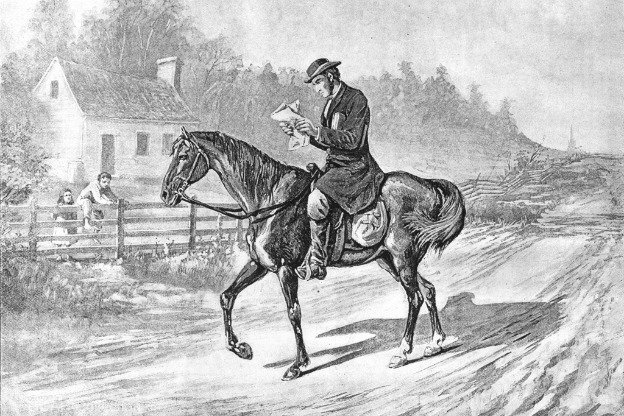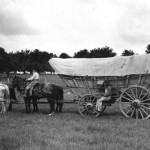In 1874, 80-year old Eli Farmer, a long-time citizen of Bloomington, Indiana–businessman, farmer, and politician—sat down to write his autobiography, to be read by his family. The final 283-page manuscript recorded curiously little about many of the aspects of Farmer’s life.
What the elderly man did choose to write about was religion – his lack of faith as a youth, his conversion, his calling to be a preacher in the Methodist church, and his adventures over nine years riding a circuit of Methodist churches, prayer meetings, and camp meetings throughout southern and central Indiana.
Eli Farmer was born in 1794 in Kentucky. The family was not well-off and moved frequently throughout his childhood. Eli did not attend school until he was 18, when he finally learned to read and write.
At the age of 19, he began to take an interest in religion, although it would be an adult Eli who, in 1820 while riverboating with his brother on the Ohio, became convinced that he was a sinner bound for hell. He found salvation at a camp meeting and almost immediately began to preach—in people’s homes, in churches, and at outdoor camp meetings.
On the frontier of the young state of Indiana, formal church buildings and trained and certified pastors were few and far between. The most successful denomination was the Methodists, who relied on men with a talent and passion for preaching but usually without formal education and training. These circuit riders covered hundreds of miles every year, calling on potential converts in their homes, preaching in small log churches, and holding outdoor camp meetings to attract new converts and invigorate existing members.
Farmer, with his lack of education but full of enthusiasm and apparently blessed with natural speaking ability, was a perfect fit for Methodist circuit riding. He was a fearless preacher, confronting “infidels” and proclaiming his message no matter the opposition from backwoods unbelievers. His autobiography is full of stirring accounts of his spiritual “warfare”:
I went to Bloomfield, which place I found filled up pretty well with infidels. I went in among them and began an aggressive warfare, and the Spirit of the Lord was with me.
Although Farmer had a wife and children, he spent many of his years as a preacher living on the circuit, housed by converts or friendly inquirers. Farmer was appointed by the Methodist leadership to different circuits throughout his ministry – in 1826, his circuit spanned 300 square miles on either side of the Wabash River in both Indiana and Illinois.
The years Farmer spent as a circuit rider brought poverty and illness to him and his family. Finally, he withdrew from preaching as a full-time occupation and became a businessman. From the 1840s until his death in 1881, he was a respected member of the business and political community. But when he looked back on his life, what Eli Farmer most remembered were the years he spent preaching, converting unbelievers, and saving souls on the Indiana frontier.
A Moment of Indiana History is a production of WFIU Public Radio in partnership with the Indiana Public Broadcasting Stations. Research support comes from Indiana Magazine of History published by the Indiana University Department of History.
Source: Riley Case, “An Aggressive Warfare: Eli Farmer and Methodist Revivalism in Early Indiana,” IMH 104 (March 2008).























